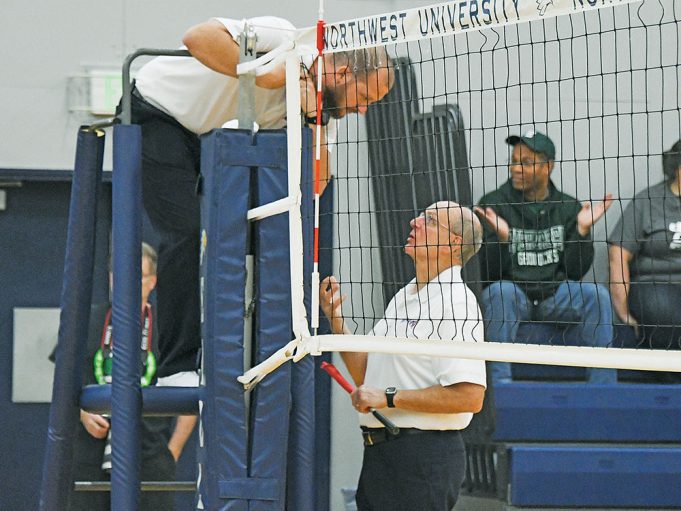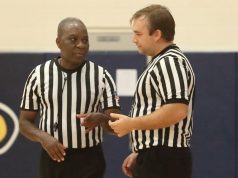Officiating is an avocation, and no two people come to it the same way or for the same reasons. I knew that whatever I chose, it had to have meaning to me, I had to feel like I was making a difference.
But that was with regard to my day job, and if someone asked me what my officiating philosophy was in my first season, I would have laughed and told that person I was just trying to get through my next game. Here in mid-life and mid-career with 16 officiating seasons under my belt, a philosophy has indeed come into focus — ironically one that stems from the overarching philosophy at my current day job (a small private liberal arts college), and it is very simple. It is relationships, resilience, and reflection, the Three R’s for short. Whether I’m training or helping students at work, training officials or working a contest, the Three R’s are driving me. At the end of the day, I have better experiences and better games when I’m working with people who operate with a similar philosophy.
Let’s examine each facet.
Relationships. My mentor, hall-of-fame official Laurette Payette, has always said, “it’s all about relationships.” Of course we all love to foster the relationships that fill us up, but Laurette showed me that those who cause us strife are sometimes the best teachers. It is easy to have relationships with your friends, but can you build a relationship with the coach that drives you nuts? How about that partner who has a hard time listening?
Relationships make five-hour car rides seem like five minutes. Relationships are what drive those emails that tell you to pick up your oar because someone got injured, or has a family illness or accident. Most of us spend too much time officiating to suggest that only our games, the money or the top assignments are what keep us coming back each year. If we think about it, it’s the people we interact with in big and small ways throughout each season that fill up our tanks.
Players, coaches and partners weave the fabric of the experience. The best advice I got about five seasons into officiating was, “Be the official you would like to work with.” For me that really meant moving past the game, the rules and fitness to realize that I was working with other humans, and sometimes the pregame really should include asking about someone’s sick mom or new grandchild.
Knowing the rules, executing them well and being fit are great, but if you make everyone tense, nervous or feel less than, what is it all for? There’s a balance in our attention to detail, professionalism and the human side of our games. People always remember how you made them feel.
There is no other group of people on the planet more resilient than officials! If you made it past your third season and decided to keep going, you are the definition of resilience. In the past 10 years, rowdy fans have escalated behavior to the point of madness where now we all worry about security at our contests, no matter what the level of play. Resilience would be impossible without relationships. We dig deep to challenge ourselves in every contest, and still no one has called a perfect game. So something deep inside us loves the cycle of continuous improvement. When the game goes wrong, we find resilience in ourselves, but call those official friends (let’s face it: non-official friends don’t really get it) who come from the relationships to help us get through, and that brings me to reflection.
To endure in our profession and continuously improve, you have to reflect on your experiences. What made something go well? When did the game get out of hand? What skills do I need to improve for the upcoming season? That isn’t a profession for people who crave routine. Something will always be different, every game has its own flavor. Thinking about how all the variables come together to create anything from magic to disaster is what makes being in our “club” so fun. There’s nothing worse for the spouse of an official than to have to sit with a whole group of officials because the officials can’t stop talking about different games, scenarios and funny stories. All of that reflection comes back to help build relationships and resilience.
It has taken time, many mentors and many experiences both on and off the field, to understand why I stay with it, what drives me to look forward to the next game with a passion that continues to grow. That is my officiating philosophy. What’s yours? Knowing what it is can bring more meaning and purpose to the work, and also help you make the ever-important decision of pressing “accept” or “decline.”
If you don’t have one, think about it in the coming season. But I’m willing to share mine with you.
What's Your Call? Leave a Comment:
Note: This article is archival in nature. Rules, interpretations, mechanics, philosophies and other information may or may not be correct for the current year.
This article is the copyright of ©Referee Enterprises, Inc., and may not be republished in whole or in part online, in print or in any capacity without expressed written permission from Referee. The article is made available for educational use by individuals.
















